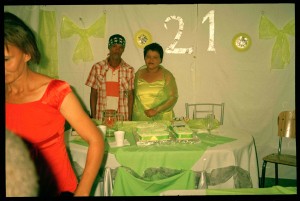Untitled

Sophia Klaase first used a camera when she participated in a photography project in 1999 as part of a long-term study in the village of Paulshoek, a remote village in Namaqualand, part of South Africa’s sparsely populated Northern Cape. At the time, she was only sixteen years old, and eagerly exploring the limited outlets for her feral imagination and vivacious nature.
Klaase has been making photographs ever since and today her collection consists of more than 1500 images. They record fourteen years of village life from the perspective of a young woman growing up in the ‘new’ South Africa, documenting family, friends, village events, daily chores and self-portraits that provide a poignant record of Sofia’s own passage into adulthood. Her images are often constructed tableau, posed and acted out as if the camera provided a stage for impromptu fantasies and playful inventions. It is evident that drugs and gang culture have found resonance with the youth of Paulshoek, and although HIV/AIDS has affected individuals in the village, it is rarely spoken of openly.
Klaase’s images tease apart just what it means to be a young woman in a social landscape that is common to millions of South Africa’s rural poor. It is striking that the vision of a ‘coloured’ South African woman, dislocated from formal sources of the visual literacy that frequently drives photographic experimentation, responds so astutely to current trends of visual representation in South Africa.
Despite the hardship of the landscape and of daily life in Paulshoek, these photographs capture moments that contradict the idea of victimhood. In them, we see evidence of celebration, as well as defiance. Klaase’s subjects are unapologetic about who they are, often confronting the lens with a sense of purpose that challenges representations of who and what they are supposed to be.